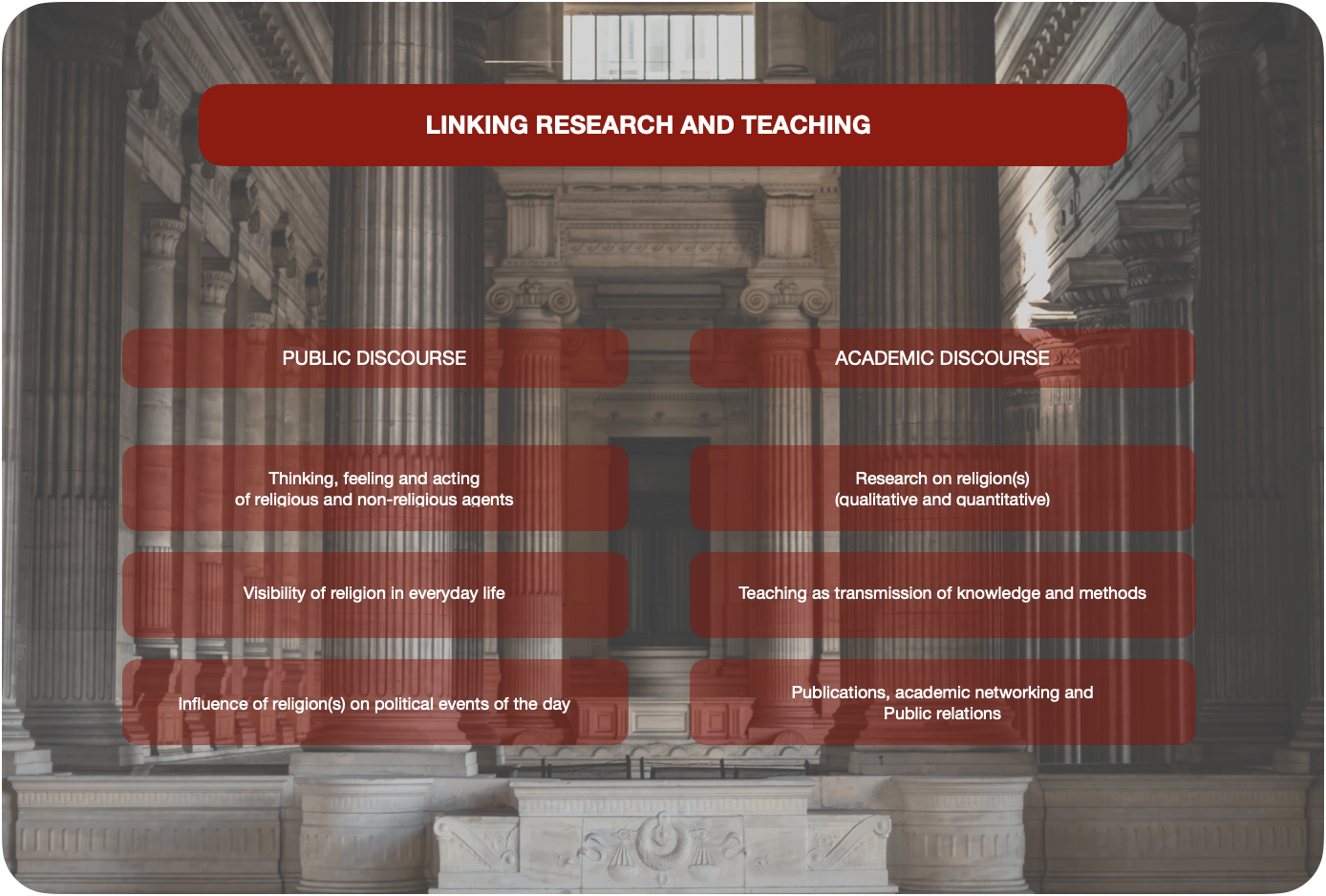Students
The discipline of Religious Studies
Guides to scientific work
- Literature list for students
(German) - 10 Fundamental Principles of the Cultural Studies Approach
- Essay writing guide (Prof. Dr. Prohl)
(German) - Guide to researching and writing scientific papers
(German) - On the general handling of primary, secondary, and tertiary sources in Heidelberg religious studies
(German) - The way to the bachelor thesis
(German)
In addition, a comprehensive binder of "Help for preparing papers and presentations" can be found in the library for your perusal.
Linking Research and Teaching at the Institute for Religious Studies

The Institute for Religious Studies in Heidelberg gives special importance to connecting research and teaching. Unlike the research of the natural sciences, research in religious studies is not carried out under strict lab conditions. Rather, the researchers are embedded in the social reality of individuals, collective bodies and institutions. As a matter of fact, religious studies research can potentially be carried out at any time and in any place.
The connection between research and teaching is based in two pillars. The first is the public discourse about religion(s). As the public discourse informs us about the thoughts, feelings and actions of religious and non-religious actors, it is one of our central concerns. For this reason, students are encouraged to stay observant, even outside of lectures, seminars and tutorials, so as to notice the signs of religious discourses, materials and practices all around them in their daily life. Visiting a train station bookseller for example, can tell us, through observing which books are on display in the 'Religion', 'Spirituality' and 'Esoteric' sections, which ideas are circulating the market, what is in high demand and which ascriptions and fantasies motivate the producers. Little buddha figurines, gongs, dreamcatchers, incense and other paraphernalia which can be purchased at the Heidelberg Christmas market show the materiality of religious objects and the forms, colours, sounds and smells which affect actors. Those who are interested in yoga, meditation, mindfulness and martials arts will soon realise that all of these psychophysical techniques are part of the religious discourse and have a complex religious history, which religious studies can describe. Those who switch of after a long day at the library by watching one or two episodes of a good TV series like Game of Thrones, will, though the religious studies gaze which they have acquired, discover hitherto unnoticed aspects of ritual and magic in the narrative of the series. Religious studies scholars come across the object of their studies at every turn. Current political affairs, with the polarisation into political camps and the irreconcilable ideas of 'wrong' and 'right', are also strongly influenced by religious discourses. Whether it be the Narrative of a 'Christian' Occident or a 'united' Islam, these fields are - as part of the current post-secular age that is simultaneously dominated by neoliberal markets and religious desire for meaning - object of religious studies research.
The second pillar is the academic discourse about religion. Religious studies scholars continually receive and produce qualitive and quantitative findings about their objects of research. Field research with religious groups for example, can lead to Essays in academic journals (such as the Zeitschrift für Religionswissenschaft (ZfR)) anthologies (like the one published by De Gruyter and Brill) or monographs which are read worldwide in university libraries and also find their way into public bookshops. Religious studies encyclopaedias, such as the Handbuch religionswissenschaftlicher Grundbegriffe, which is a continually renewed reference work, are a category in their own right. Historical research in libraries and archives or philological research into source languages and religious texts extend the knowledge of religious studies scholars and are the foundation for learning for students. Methodological literature by and for scholars of religious studies aids the deeper understanding of the tools with which discourses, practices and materials can be investigated. They are the cultural studies equivalent to the laws and theories of the natural sciences and help us to interpret the complexity of social processes and explain relationships. At large religious studies conferences like the DVRW (Deutsche Vereinigung für Religionswissenschaft) advanced and PhD students, postdocs and professors exchange ideas about their respective research. Findings are critically discussed with the aim of helping colleges with current or future projects.
The teaching at the Heidelberg Institute of Religious Studies is based in the aforementioned two pillars: public and academic discourses about religion(s). Current research findings of staff are included in teaching and improved by the critical feedback of students.
published: 2021